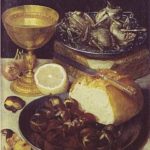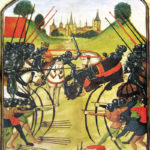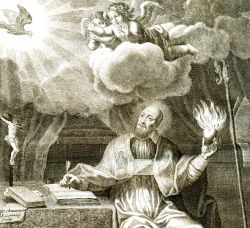 Our Holy Founder of the Visitation Order, St Francis de Sales, will be celebrated on January 24. This year we share excerpts of his teachings and life as a spiritual preparation, from the book The Beauties of St. Francis de Sales, excerpted from Bishop Camus’ writings.
Our Holy Founder of the Visitation Order, St Francis de Sales, will be celebrated on January 24. This year we share excerpts of his teachings and life as a spiritual preparation, from the book The Beauties of St. Francis de Sales, excerpted from Bishop Camus’ writings.
Day one- January 15th
HUMILITY
St. Francis always discouraged professions of humility, if they were not very true and very sincere. “Such professions,” he said, “are the very cream, the very essence of pride: the really humble man wishes to be, and not to appear so. Humility is timorous, and starts at her shadow; and so delicate, that if she hears her name pronounced, it endangers her existence. He who blames himself, takes a by-road to praise; and like the  rower, turns his back to the place whither he desires to go. He would be irritated if what he said against himself was believed; but from a principle of pride, he desires to appear humble.”
rower, turns his back to the place whither he desires to go. He would be irritated if what he said against himself was believed; but from a principle of pride, he desires to appear humble.”
Day Two- January 16
MEEKNESS.
I once observed to a celebrated churchman, that I admired the wonderful meekness of the Bishop of Geneva, (St Francis de Sales) with which he governed all things in peace; he does what he pleases, said I, and in so mild a manner, yet so firm, that no one can resist him:—a thousand fall at his left hand, and ten thousand at his right. Everything, with him, tends to persuasion:—he attains his end with sweetness and energy;—before you think he has set out, he has reached the goal. He replied with great judgment, “It is that mildness, which renders him so powerful; know you not that steel is stronger than iron, but of a temper more  flexible? ‘Blessed are the meek, for they shall inherit the earth. All they wish is in their power;—they reign over all hearts, and all are attracted by their sweetness.” It was a frequent Aphorism of St. Francis, “Blessed are the hearts which bend, they never break. “No, certainly they never are broken themselves, but frequently they break others to their opinions.”
flexible? ‘Blessed are the meek, for they shall inherit the earth. All they wish is in their power;—they reign over all hearts, and all are attracted by their sweetness.” It was a frequent Aphorism of St. Francis, “Blessed are the hearts which bend, they never break. “No, certainly they never are broken themselves, but frequently they break others to their opinions.”
Day Three January 17
ST. FRANCIS NEVER ASKED AND NEVER DENIED.
 According to his maxim of asking nothing and refusing nothing, he was in the habit of accepting the little presents offered him by the Peasants. It was pleasing to see in what manner and with what feelings he received their handfuls of filberts, chestnuts, apples, or the small cheeses and eggs, brought by the poor; some would present him with half-pence, pence, or farthings, all which he received with humility, and expressions of gratitude. He would even receive the pence sent by the villagers to say Masses for them, and would perform them with deep attention. He used on leaving church, to distribute the money to the poor he chanced to meet with, but the eatables he would carry home and give to his steward, with orders that they should be sent up to table.
According to his maxim of asking nothing and refusing nothing, he was in the habit of accepting the little presents offered him by the Peasants. It was pleasing to see in what manner and with what feelings he received their handfuls of filberts, chestnuts, apples, or the small cheeses and eggs, brought by the poor; some would present him with half-pence, pence, or farthings, all which he received with humility, and expressions of gratitude. He would even receive the pence sent by the villagers to say Masses for them, and would perform them with deep attention. He used on leaving church, to distribute the money to the poor he chanced to meet with, but the eatables he would carry home and give to his steward, with orders that they should be sent up to table.
Day Four-January 18
 The RECONCILED ENEMY.
The RECONCILED ENEMY.
St. Francis did not approve of the saying—“Never rely on a reconciled enemy.” He rather preferred a contrary maxim; and said, that a quarrel between friends, when made up, added a new tie to friendship: as experience shows, that the callosity formed round a broken bone, makes it stronger than before. Those who are reconciled, often renew their friendship with increased warmth; the offender is on his guard against a relapse, and anxious to atone for past unkindness; and the offended glory in forgiving and forgetting the wrongs that have been done to them. Princes are doubly careful of reconquered towns, and preserve them with more care than those the enemy never gained.
 Day Five-January 19 Patience
Day Five-January 19 Patience
ST. Francis was a declared enemy to eagerness, which he called the delirium of devotion; for the spirit of true devotion is mild and equal, but impatience is turbulent and uneasy; and while it thinks itself building, it is in fact destroying.The worst kind of imitation is that which tries to do several things at once. He said it was like wanting to thread several needles at the same time:-he who undertakes too many things, will succeed in none. In whatsoever St. Francis did, he applied his whole mind to the business immediately before him, as if it were his only care in this world.
Day Six-January 20 EQUANIMITY.
 I know nothing more sedulously inculcated by St. Francis, than the absolute necessity of equanimity of mind: as this life is a voyage to the harbor of salvation, we must be careful pilots, and hold strait the helm amidst the inequality of the waves.
I know nothing more sedulously inculcated by St. Francis, than the absolute necessity of equanimity of mind: as this life is a voyage to the harbor of salvation, we must be careful pilots, and hold strait the helm amidst the inequality of the waves.
We must imitate the mariners, who guide themselves by continually observing the pole. Our guide is the Will of God, on which our eyes should continually be fixed. Inequality of mind proceeds from attention to secondary causes, and thus our humor changes with every changing Occurrence. But when, through all the strange variety, we can still perceive the unalterable Will of God, who distributes as he sees best, sickness and health, wealth and poverty, life and death; and when we reflect, that from every circumstance we may extract causes and means to glorify God, we enter into the Christian contest, which produces perfect equanimity of temper.
Day Seven- January 21
![]() JUSTICE AND JURISPRUDENCE.
JUSTICE AND JURISPRUDENCE.
THERE is a great difference between moral justice and legal justice. The just man is equitable, and renders to every one his due. The man of justice is an official person—a magistrate, who professes equity according to the rules of jurisprudence. They were originally intended to maintain individual right, according to the rules of integrity; but by the evil dispositions of men, it sometimes happens that they are the means of depriving men of possessions they ought to guarantee to them, and the wealth falls into the hands of those who fight for it. From whence the proverb,— “While two contend, the third enjoys.” The multitude of laws and lawyers, stifle justice, which is like a silkworm entombed in its own net.
Day Eight- January 22
 The PROVIDENCE OF GOD ORDERS ALL THINGS
The PROVIDENCE OF GOD ORDERS ALL THINGS
ST. Francis looked over secondary causes, and in all events considered the hand of God as ordering and governing all things. “Nothing can happen to us,” he said, “except sin, that is not ordered by God, whether prosperous or adverse, for God is the fountain of good. Every good and every perfect gift comes down from him, who is the Father of lights; and there is no evil, not ordered by God, except Sin, which he only permits. Besides, properly speaking, sins cannot befall us:—an event proceeds from a cause; sin proceeds from our hearts. Oh what a happiness would it be for us, if we could receive all things as gifts from Him who opens his hands and fills all things living with plenteousness. How would this conviction soften affliction, —it would extract milk from the rock, and honey from the stony rock,–what moderation would grace prosperity, since God sends us prosperity and adversity; to draw from them. His glory and our salvation. Think well of this, and accustom yourselves to see God in every dispensation of his all wise providence, and in every event see only God; that in all things, God, the Father of our Lord Jesus Christ, may be honored; who consoles us in all our grief, and makes all events work together for good, to those who love him.”
Day Nine-January 23 ST. FRANCIS LOSES A RING.
 In the year 1619, Christina of France, the King’s sister, was married at Paris, to the Prince of Piedmont, heir of the house of Savoy. St. Francis accompanied the Cardinal of Savoy to the ceremony, and the young Princess of Piedmont esteemed him so highly, that she requested he might be named her Grand Almoner: he was constrained to accept the office, but, on condition that it should not interfere with his Episcopal duties. He was in consequence under the necessity of attending the Princess of Piedmont to Piedmont, where he remained some days, and then desired leave to return to his Diocese. This permission was granted with great unwillingness. This illustrious Princess made him noble presents, and among them was a diamond ring, of great value. On the road, as he was passing the Alps, on horse-back, when drawing off his glove the ring slipped from his finger unnoticed. When his loss was discovered, he calmly blessed God for it, for two reasons, he said, “the first, that I shall not be tempted to set too great value on a jewel; the second, because under providence it will be the means of making the fortune of some person who may find it, and who may be rendered thereby comfortable for the remainder of his life, in which case, the loss is a gain.” However, it turned out differently from what he had expected, for, being found by a Peasant, ignorant of its value, and brought by him to the Village where St. Francis had stopped, it was sent him again, when he was very liberal to the Peasant who found it. One may see how little this good Bishop’s heart was attached to what usually infatuate men. He knew that in Heaven treasures were prepared for him, superior to all that the world contained.
In the year 1619, Christina of France, the King’s sister, was married at Paris, to the Prince of Piedmont, heir of the house of Savoy. St. Francis accompanied the Cardinal of Savoy to the ceremony, and the young Princess of Piedmont esteemed him so highly, that she requested he might be named her Grand Almoner: he was constrained to accept the office, but, on condition that it should not interfere with his Episcopal duties. He was in consequence under the necessity of attending the Princess of Piedmont to Piedmont, where he remained some days, and then desired leave to return to his Diocese. This permission was granted with great unwillingness. This illustrious Princess made him noble presents, and among them was a diamond ring, of great value. On the road, as he was passing the Alps, on horse-back, when drawing off his glove the ring slipped from his finger unnoticed. When his loss was discovered, he calmly blessed God for it, for two reasons, he said, “the first, that I shall not be tempted to set too great value on a jewel; the second, because under providence it will be the means of making the fortune of some person who may find it, and who may be rendered thereby comfortable for the remainder of his life, in which case, the loss is a gain.” However, it turned out differently from what he had expected, for, being found by a Peasant, ignorant of its value, and brought by him to the Village where St. Francis had stopped, it was sent him again, when he was very liberal to the Peasant who found it. One may see how little this good Bishop’s heart was attached to what usually infatuate men. He knew that in Heaven treasures were prepared for him, superior to all that the world contained.